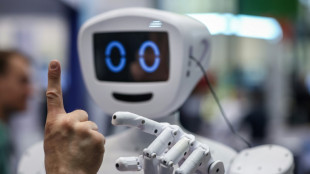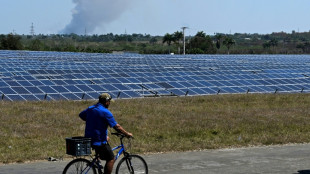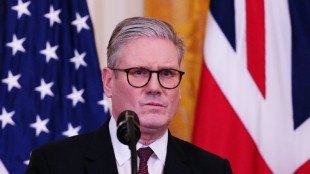
-
 Albon says Thailand taking bid for F1 race 'very seriously'
Albon says Thailand taking bid for F1 race 'very seriously'
-
'It's gone': conservation science in Thailand's burning forest

-
 Protest as quake-hit Myanmar junta chief joins Bangkok summit
Protest as quake-hit Myanmar junta chief joins Bangkok summit
-
EU leaders push for influence at Central Asia summit

-
 Asian stocks extend global rout after Trump's shock tariff blitz
Asian stocks extend global rout after Trump's shock tariff blitz
-
Lewandowski, Mbappe duel fuelling tight La Liga title race

-
 South Korea court upholds President Yoon's impeachment, strips him of office
South Korea court upholds President Yoon's impeachment, strips him of office
-
Liverpool march towards title as Man City face Man Utd

-
 Finland's colossal bomb shelters a model for jittery Europe
Finland's colossal bomb shelters a model for jittery Europe
-
Athletes frustrated as France mulls Muslim headscarf ban in sport

-
 Korda downs Kupcho to stay alive at LPGA Match Play
Korda downs Kupcho to stay alive at LPGA Match Play
-
German industry grapples with AI at trade fair

-
 Irish school trains thatchers to save iconic roofs
Irish school trains thatchers to save iconic roofs
-
'Frightening': US restaurants, producers face tariff whiplash

-
 Cuba looks to sun to solve its energy crisis
Cuba looks to sun to solve its energy crisis
-
Experts warn 'AI-written' paper is latest spin on climate change denial

-
 PSG eye becoming France's first 'Invincibles'
PSG eye becoming France's first 'Invincibles'
-
Late birdie burst lifts Ryder to Texas Open lead

-
 Five potential Grand National fairytale endings
Five potential Grand National fairytale endings
-
Trump purges national security team after meeting conspiracist

-
 More work for McIlroy even with two wins before Masters
More work for McIlroy even with two wins before Masters
-
Trump hopeful of 'great' PGA-LIV golf merger

-
 No.1 Scheffler goes for third Masters crown in four years
No.1 Scheffler goes for third Masters crown in four years
-
Where Trump's tariffs could hurt Americans' wallets

-
 Trump says 'very close to a deal' on TikTok
Trump says 'very close to a deal' on TikTok
-
Trump tariffs on Mexico: the good, the bad, the unknown

-
 Postecoglou denies taunting Spurs fans in Chelsea defeat
Postecoglou denies taunting Spurs fans in Chelsea defeat
-
Oscar-winning Palestinian director speaks at UN on Israeli settlements

-
 With tariff war, Trump also reshapes how US treats allies
With tariff war, Trump also reshapes how US treats allies
-
Fernandez fires Chelsea into fourth as pressure mounts on Postecoglou

-
 South Korea court to decide impeached president's fate
South Korea court to decide impeached president's fate
-
Penguin memes take flight after Trump tariffs remote island

-
 E.T., no home: Original model of movie alien doesn't sell at auction
E.T., no home: Original model of movie alien doesn't sell at auction
-
Italy's Brignone has surgery on broken leg with Winter Olympics looming

-
 Trump defiant as tariffs send world markets into panic
Trump defiant as tariffs send world markets into panic
-
City officials vote to repair roof on home of MLB Rays

-
 Rockets forward Brooks gets one-game NBA ban for technicals
Rockets forward Brooks gets one-game NBA ban for technicals
-
Pentagon watchdog to probe defense chief over Signal chat row

-
 US tariffs could push up inflation, slow growth: Fed official
US tariffs could push up inflation, slow growth: Fed official
-
New Bruce Springsteen music set for June 27 release

-
 Tom Cruise pays tribute to Val Kilmer
Tom Cruise pays tribute to Val Kilmer
-
Mexico president welcomes being left off Trump's tariffs list

-
 Zuckerberg repeats Trump visits in bid to settle antitrust case
Zuckerberg repeats Trump visits in bid to settle antitrust case
-
US fencer disqualified for not facing transgender rival

-
 'Everyone worried' by Trump tariffs in France's champagne region
'Everyone worried' by Trump tariffs in France's champagne region
-
Italy's Brignone suffers broken leg with Winter Olympics looming

-
 Iyer blitz powers Kolkata to big IPL win over Hyderabad
Iyer blitz powers Kolkata to big IPL win over Hyderabad
-
Russian soprano Netrebko to return to London's Royal Opera House

-
 French creche worker gets 25 years for killing baby with drain cleaner
French creche worker gets 25 years for killing baby with drain cleaner
-
UK avoids worst US tariffs post-Brexit, but no celebrations


Common water disinfectant creates potentially toxic byproduct: study
A group of chemical compounds used to disinfect water for one-third of the US population and millions of others globally produces a potentially toxic byproduct, according to new research published Thursday, sparking calls for an "immediate" investigation into possible health impacts.
Inorganic chloramines have been used for decades to remove pathogens from public water supplies.
Though chlorine remains the most widely used disinfectant in the US and globally, chloramines have increasingly replaced it in many systems to reduce certain byproducts linked to bladder and colon cancer, low birth weight, and miscarriage.
Today, more than 113 million Americans rely on chloraminated drinking water, with the compound also in use across Canada, Asia, and Europe.
"However, chloramines themselves decompose into products that are poorly characterized," said Julian Fairey, lead author of the study published in the journal Science, during a press briefing.
One such product, identified more than 40 years ago but left chemically unresolved, was simply dubbed the "unidentified product."
Fairey and his team have finally cracked the mystery.
Using a combination of traditional chemistry methods and modern tools like high-resolution mass spectrometry and nuclear magnetic resonance spectroscopy, they identified the compound as "chloronitramide anion."
The compound was detected in all 40 chloraminated drinking water samples tested, with concentrations reaching up to 100 micrograms per liter -- exceeding typical regulatory limits for disinfection byproducts, which range between 60 and 80 micrograms per liter.
Although toxicological studies have yet to be conducted, the researchers sounded a warning.
"The chemical structure looks concerning, as does the concentrations at which this compound is forming, so we certainly think health effects studies are warranted," Fairey said.
Their study calls for the compound to be "an immediate candidate" for quantification in public waters and for closer health and toxicity studies.
Water utilities could consider reverting to chlorine, Fairey suggested, though this would require secondary disinfectants to neutralize the known toxic byproducts chlorine produces.
With further study and regulatory action likely years away, the researchers recommended home filtration systems using activated carbon blocks for people who are concerned.
D.Moore--AMWN


